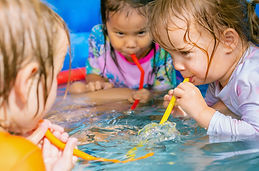
Curriculum
We provide a highly integrated, developmentally-appropriate curriculum that grows out of the interests of the children and will prepare them for their next school level.
Explorer Children’s School’s emphasis is placed on exploring art in all of its forms, literacy, science, engineering and math topics and concepts through high quality, hands-on, open-ended, play-based learning experiences. Social-emotional learning is paramount and integrated into the entire day.

What is PLAY-BASED education?
Play-based learning is an educational approach that incorporates play as a central component of the learning process. It recognizes that children learn best through active engagement and exploration in a meaningful and enjoyable context. As children play, they engage their imagination, take risks, and learn problem-solving to support their development.
Children learn everything they need to know, including all pertinent school standards, through a high quality, free choice and planned play-based method combined with intentional projects.
Have a question?
What does PLAY-BASED learning look like?
A young child’s “work” is play! Through play and projects at ECS, they will explore and learn about:
…all forms of art like music, dance, painting, sculpture, imaginative play
…all forms of literacy including the pure joy of listening to and telling stories
…in physics like gravity, force/motion, energy, inertia, magnetism, light, simple machines
…in earth sciences, properties of non living materials: sand, rocks, clay, water
…in life sciences, all about living things, photosynthesis, senses/bodies
…in engineering, engineering design process, balance & symmetry, stability, tower and bridge forms
…simple coding and robotics
…all math concepts and numbers are integrated into other curriculum, plus manipulatives, measuring/comparing
…science concepts such as the scientific method, observing, comparing, classifying, communicating, inferring, hypothesizing
…a sense of time and history
…physical activity, small and large motor
…a sense of what community is and how we care for each other
…social emotional learning is organically woven and intentionally taught throughout all of the above




We use play-based learning and teachers' observations to offer tailored materials and discussions for further learning. The learning story examples shown here are just one assessment tool teachers use for this purpose.
Click on each to learn more!
Through the lens of an Arts and STEM-based program, we provide developmentally appropriate materials and curriculum in all areas of development.

We capitalize on children’s learning through play. When children are given space and time to play alone and with each other, their imaginations can flourish. Learning while playing promotes problem solving, self regulation, and critical thinking.
-
We create very intentional environments with high quality materials, especially in art (all forms), science, engineering, math
-
We know that young children have a tremendous capacity to form deep mental reservoirs of knowledge about topics when given the chance, so we have long, uninterrupted play sessions and robust sharing, reflection and creating about what they learn
Linking play to educational goals, teachers observe/reflect/document so they can further the learning goals through open ended questions or guided play experiences. Children discuss and “document” their own learning. And samples of learning are shared or sent home periodically.
ECS believes in supporting cognitive development. The environments are planned to encourage curiosity, exploration and problem solving in an atmosphere of joy, warmth, affection and respect for each child.
-
Children will have the opportunity to learn complex STEM concepts and art techniques as far as they desire
-
Children organically learn and practice the scientific process by experimenting, discussing, and asking more questions…and teachers add in the documentation and reflection piece
-
Teachers offer frequent feedback to caregivers, more formal conferences once a year, and regularly display children’s knowledge throughout the school
And most importantly, they will nurture and build those important brain connections and have a seed planted for a life-long joy of learning and discovery.







